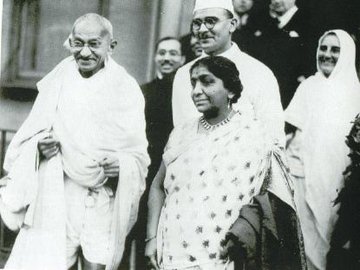
Sarojini Naidu
‐
Poet, campaigner for women's rights and prominent Indian nationalist
Other names
Sarojini Chattopadhyaya
Place of birth
Date of arrival to Britain
Location(s)
Cambridge
CB3 0JG
United Kingdom
Place of death
United Provinces, India
Date of time spent in Britain
1895–8 (as a student), 1905 (book tour of Britain for The Golden Threshold), 1912–14, 1919–21 (with All India Home Rule League), 1931 (Second Round Table Conference with M. K. Gandhi)
About
A student at King’s College London and Girton College, Cambridge in the early 1890s, and a writer of precocious if imitative verse, Naidu was feted in London in the 1900s as the poet of an exoticized India.
From a Bengali family based in Hyderabad, Naidu was sent to Britain in 1895 on the Nizam's scholarship on the strength of her poetry. She was then not married and was known as Sarojini Chattopadhyaya. However, in Hyderabad she had already embarked on a romantic relationship with Dr Govindarajalu Naidu, who had studied medicine at Edinburgh; her father, Aghorenath Chattopadhyaya, had also been a student at Edinburgh University.
She became the ward of Elizabeth Manning, the Secretary of the National Indian Association, whose stepmother had been involved in the foundation of Girton College, Cambridge. Naidu was heavily influenced by the poets Edmund Gosse, Arthur Symons and W. B. Yeats. Particularly interesting accounts of her very early Europeanized work appear as the introductions to her second and third collections, by Arthur Symons and Edmund Gosse respectively. Her poetry also appeared in the Savoy. Appearances and readings by Naidu in the 1900s were reported in the Indian Magazine.
Naidu returned to India in 1898, beset by the ill health that dogged her throughout her life. She maintained correspondence with poets in Britain but also embarked on a political career. Her returns to Britain were marked by poetry readings and receptions, convalescence in British nursing homes, as well as political rallies and meetings. She joined the Indian National Congress in 1904 and was vocal about women's rights. She gave evidence in 1919 to a Select Committee in favour of the women's vote in India. She also had a public confrontation with Edwin Montagu over the Amritsar Massacre. Naidu had met M. K. Gandhi in London in 1914 and became very close to him. She accompanied him on the famous Dandi salt march and accompanied him to the Round Table Conference in 1931. Naidu was appointed Governor of United Provinces in 1947 and died in office in February 1949.
Poetry readings, London, 1900s
Asaf Ali, E. J. Beck, Annie Besant, Harindranath Chattopadhyaya (brother), Virendranath Chattopadhyaya (brother), G. K. Chettur, M. K. Gandhi, Edmund Gosse, Mithan J. Lam (women's rights), Elizabeth Adelaide Manning, Arthur Symons, Rabindranath Tagore, Herabai Tata (women's rights), W. B. Yeats.
Songs (1895)
The Golden Threshold (London: William Heinemann, 1905)
The Bird of Time (London: William Heinemann, 1912)
The Broken Wing (London: William Heinemann, 1917)
Also nationalist speeches, for an extract see Susie Tharu and K. Lalita, Women Writing in India, Vol. 1 (New York : Feminist Press at the City University of New York, 1991)
Baig, Tara Ali, Sarojini Naidu (New Delhi: Government of India, 1974)
Banerjee, Hasi, Sarojini Naidu: The Traditional Feminist (Calcutta: K. P. Baghci & Co., 1998)
Boehmer, Elleke, ‘East Is East’, in Stories of Women: Gender and Nationalism in the Postcolonial Nation (Manchester: Manchester University Press, 2005), pp. 158–71
Boehmer, Elleke, Indian Arrivals 1870–1915: Networks of British Empire (Oxford: Oxford University Press, 2015)
Mukherjee, Sumita, Indian Suffragettes: Female Identities and Transnational Networks (New Delhi: Oxford University Press, 2018)
Paranjape, Makarand (ed.) Sarojini Naidu: Selected Letters 1890s to 1940s (New Delhi: Kali for Women, 1996)
Raychaudhuri, Tapan, ‘Naidu, Sarojini (1879–1949)’, Oxford Dictionary of National Biography (Oxford University Press, 2010) [http://www.oxforddnb.com/view/article/47743]
Sengupta, Padmini, Sarojini Naidu: A Biography (Delhi: Asia Publishing House, 1966)
Snaith, Anna, Modernist Voyages: Colonial Women Writers in London, 1890–1945 (Cambridge: Cambridge University Press, 2014)
Sturgeon, Mary C., Studies of Contemporary Poets (London: Harrap & Co., 1920)
Photograph of Naidu as the little ‘Indian princess’ appears in Maud Gonne’s The Servant of the Queen
Mss Eur A95, Asian and African Studies Reading Room, British Library, St Pancras
Mss Eur F341/152, Geraldine Forbes collection, Asian and African Studies Reading Room, British Library, St Pancras
National Archives of India, Delhi
Nehru Memorial Library, Delhi
For image and copyright details, please click "More Information" in the Viewer.
Image credit
By unknown author – Public domain, https://commons.wikimedia.org/w/index.php?curid=175707
